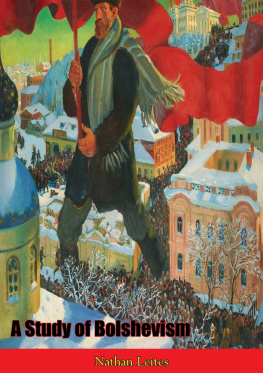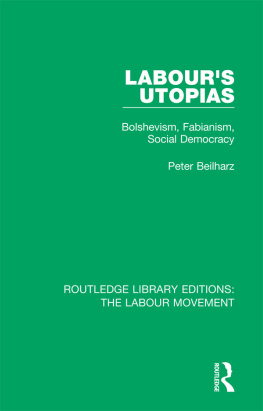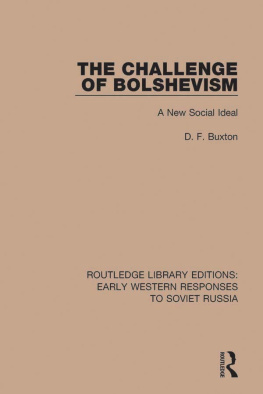Barakaldo Books 2020, all rights reserved. No part of this publication may be reproduced, stored in a retrieval system or transmitted by any means, electrical, mechanical or otherwise without the written permission of the copyright holder.
Publishers Note
Although in most cases we have retained the Authors original spelling and grammar to authentically reproduce the work of the Author and the original intent of such material, some additional notes and clarifications have been added for the modern readers benefit.
We have also made every effort to include all maps and illustrations of the original edition the limitations of formatting do not allow of including larger maps, we will upload as many of these maps as possible.
A STUDY OF BOLSHEVISM
BY
NATHAN LEITES
TABLE OF CONTENTS
Contents
TABLE OF CONTENTS
REQUEST FROM THE PUBLISHER
DEDICATION
for Martha Wolfenstein
Acknowledgments
I owe much to conversations with Elsa Bernaut, Margaret Mead, Hans Speier and Martha Wolfenstein; to discussions in the Project, Research in Contemporary Cultures at Columbia University and in the Project, Studies in Soviet Culture at the American Museum of Natural History; and to collaboration with my colleagues on the staff of The RAND Corporation.
I received many important criticisms and suggestions from readers of earlier drafts: Bernard Brodie, Herbert Dinerstein, Herbert Goldhamer, Joseph Goldsen, Leon Goure, Victor Hunt, Harold Lasswell, Ithiel Pool, Edward Shils, Martha Wolfenstein.
The study was a part of the research program undertaken by The RAND Corporation for the United States Air Force. A brief summary of the study was published as The Operational Code of the Politburo , McGraw-Hill, New York, 1951.
Much of the psychoanalytic awareness, without which I could not have written this study, I owe to Rudolph Loewenstein and Martha Wolfenstein.
NATHAN LEITES
Washington, D.C.
January 20, 1953
Both Vladimir Ilyich [Lenin] and Alexander Ilyich (his brother] were...chess enthusiasts from childhood. Their father also played, At first father used to win, Vladimir Ilyich related to me. Then my brother and I got hold of a chess manual and began to beat father. Oncewhen our room was upstairswe met father coming out of the room with a candle in his hand and the manual under his arm. Then he went to study it.
(From the memoirs of Lenins wife)
Darling mother, I send much love from Naples, I arrived here by steamer from Marseilles cheap and pleasant. It was like travelling down the Volga.
(A postcard of Lenin to his mother, August 1, 1910)
It would be to our great disadvantage if our neighbors were to perceive us more minutely and from a shorter distance. In the fact that, so far, they have understood nothing about us, lay our great strength. But the point is, that at present, it seems, alas, that they are beginning to comprehend us better than heretofore: this is very dangerous.
(Dostoevsky: The Diary of a Writer )
Introduction
In this book I shall attempt to portray the spirit of the Bolshevik elitethe elite which in 1903 had a dominant influence on a few hundred members of the Russian Social-Democratic Workers Party, and today influences several hundred million people in Europe, Asia and elsewhere.
In doing so, I have a two-fold objective: to contribute to our knowledge of the varieties of man; and to enhance the skill of Western policy-makers in dealing with the Politburos of the Soviet and other Communist parties. {1} {2} {3}
There are various ways to study the spirit of a ruling group. Here I have chosen just one: the analysis of its doctrine. It is conceivable that future researches will show other procedures to be equally, or more, productive.
I do not propose to analyze Bolshevik doctrine as fully as possible, but rather to take one aspect of it: what I call the operational code, that is, the conceptions of political strategy. Future research may deal in a comparable manner with other aspects of Bolshevik ideology. We cannot now prejudge the relation, and relevance, of the results to be obtained by such different foci of study.
Yet, further, I do not attempt to interpret as large a sample as might be feasible of Bolshevik discussions relevant to their operational code, I have, rather, concentrated on an intensive analysis of the entire recorded verbal production of Lenin and Stalin. Thereby I do not mean to imply that there are no differences between their codesthere are many significant divergencies between them which I shall discuss. Nor do I mean to affirm that the statements of other Bolshevik leaders are less relevant; they, too, will have to be studied, and the results may well qualify or invalidate hypotheses presented here; or they may bear them out, or qualify them only little.
There are some further limitations on the scope of this book. I shall not attempt, systematically, to discover the complex of conditions which made for the adoption by the Bolshevik elite of the operational code I shall describe, and for the changes it has undergone. Thus I shall not be interested in the ideological derivation of various elements of the code. Those who know Marxism will notice that certain components of the Bolshevik code are generally Marxist; and those who know other variants of Russian Marxism will notice that certain components are generally Russian Marxist. This is important; but not for my present purpose.
Also, I shall not try to assess the degree of realism of the beliefs about politics which make up the code. (I believe that such a study would, not surprisingly, show that in most instances the code is neither entirely realistic nor utterly fantastic.) And I shall not strive to assess the exact influence of the code on Bolshevik policy-making, its successes and failures.
It is often believed that if a social scientist attempts to sketch a portrait of a certain group, he is bound to affirm that the countenance of that group is in all respects unique. Such an affirmation would be obviously false; and I do not see why it should be required. It would be often easy, and always possible, to find a non-Bolshevik replica of every element in the Bolshevik doctrine I shall be delineating, (Although in such cases the Bolshevik emphasis might be different from the non-Bolshevik one.) That is both obvious and irrelevant. For it will be difficult, if not impossible, to find a non-Bolshevik replica of the entire constellation of elements which is Bolshevik doctrine. While it is possible to find doctrines similar to it, this does not invalidate the aim I have set myself, as long as these doctrines together with Bolshevism form a distinct class. Thus it might be usefulfor the establishment of certain propositionsto view Bolshevik doctrine as a member of the class of totalitarian doctrines. {4}
This book shows, I believe, that the study of the Bolshevik operational code is a relevant avenue to the delineation of the Bolshevik spirit. This is not surprising: politics is central in the life of a Bolshevik leader. He does not participate in politics as in one activity of a multi-dimensional life; he lives to conduct politics. Feeling and thinking about politics expresses (though he may not know it) his major emotions, his central fantasies. These I shall try to depict.
But is this study important in making Politburo behavior more predictable in 1953 and the years to follow? The study is, I believe, relevant for this purpose too, though there are definite limits to its value in this respect.












